Find out how industrial warehouses use conveyors to improve their material handling operations.
A Brief History of Conveyor Systems
Today’s conveyor systems offer modern state-of-the-art features. However, companies have been using this technology since the nineteenth century. Thomas Robbins invented them for the coal industry in 1892. In 1913, Henry Ford began using them in his iconic automobile assembly line. Since then, they have become integral to industrial operations in every sector. Industrial operations use them in every stage of the production and transportation process. Continue reading to learn more about conveyor systems for industrial warehouses. Need a conveyor for your operation? Contact us today for a quote.
What Is a Conveyor System?
A conveyor system moves materials efficiently from one location to another. They are beneficial for operations that need to move a large number of materials or heavy materials. This allows you to increase productivity. Conveyor systems also improve workplace safety and reduce operating costs.
What Are Conveyors Used For
Conveyors allow you to transport materials quickly and efficiently. They can also streamline your operation and help you meet your quotas. Industrial warehouse operators use them:
Industries That Use Conveyors
Many industries use conveyors in their material handling processes. Some of these industries include:
Powered Conveyors vs. Unpowered Conveyors
Both manual and powered conveyor systems can drastically reduce the effort needed to transport materials. Conveyors may also be motorized or powered by gravity. Pneumatic-powered conveyors use a series of pipes and air pressure to transport materials. Motorized and pneumatic are more complex and designed for heavier applications.
Mounting Styles
Conveyor systems can be floor or ceiling-mounted, depending on their purpose and your facility. Overhead conveyor systems allow you to save floor space, while floor conveyors can add versatility to your operation. Many facilities utilize both types to maximize space and efficiency.
Types of Conveyor Systems
There are many different industrial conveyors, each serving a different purpose. Some of these conveyors include:
Belt Conveyors System
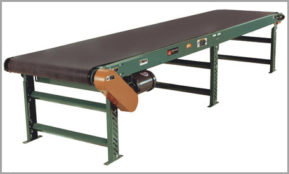 A belt conveyor system uses a continuous conveyor belt to transport materials along the surface. The belt is comprised of an endless loop. Two pulleys operate to keep materials in motion. Conveyor manufacturers make these belts from rubber, leather, and other materials. Most belt conveyors are motorized or powered by air pressure.
A belt conveyor system uses a continuous conveyor belt to transport materials along the surface. The belt is comprised of an endless loop. Two pulleys operate to keep materials in motion. Conveyor manufacturers make these belts from rubber, leather, and other materials. Most belt conveyors are motorized or powered by air pressure.
Plastic Belt Conveyors
Plastic belt conveyors are made of high-quality plastic links. This design allows them to glide smoothly over sharp edges and turns. They can even create spirals, making them an excellent choice for complex applications.
Accumulation Conveyors
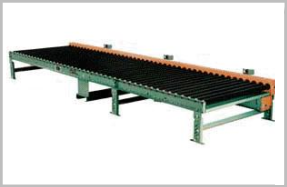 Accumulation conveyors pause the movement of materials at designated times. This can create a buffer so a human or robot can complete specific tasks. This can be used for product assembly, packaging, processing, or other applications. They can also keep materials from touching or damaging each other.
Accumulation conveyors pause the movement of materials at designated times. This can create a buffer so a human or robot can complete specific tasks. This can be used for product assembly, packaging, processing, or other applications. They can also keep materials from touching or damaging each other.
Powered Roller Conveyors
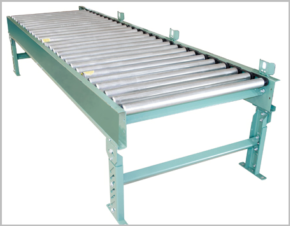 These conveyor systems transport products and materials using metal rollers and motorized operations. Some or all rollers are motorized in these systems for efficient delivery.
These conveyor systems transport products and materials using metal rollers and motorized operations. Some or all rollers are motorized in these systems for efficient delivery.
Line Shaft Conveyors
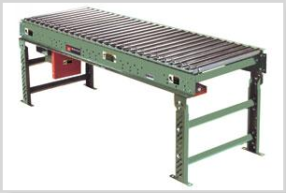 Line shaft conveyors are powered roller conveyors powered by a shaft underneath and are ideal for light applications. These conveyors can manage cardboard boxes and smaller items. They are typically affordable and quiet and offer low-maintenance operations.
Line shaft conveyors are powered roller conveyors powered by a shaft underneath and are ideal for light applications. These conveyors can manage cardboard boxes and smaller items. They are typically affordable and quiet and offer low-maintenance operations.
Chain-Driven Roller Conveyors
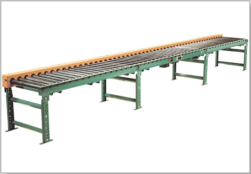 Chain-driven roller conveyors also feature motorized metal rollers powered by a chain connected to a motor. They are often used in warehouses and other industrial operations that handle materials like pallets, sheet metal, and other structural shapes. They work best for heavy, flat materials.
Chain-driven roller conveyors also feature motorized metal rollers powered by a chain connected to a motor. They are often used in warehouses and other industrial operations that handle materials like pallets, sheet metal, and other structural shapes. They work best for heavy, flat materials.
Sortation Conveyors
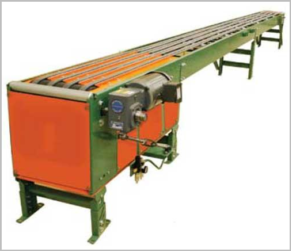 Sortation conveyors are designed to sort items into various categories. This allows you to manage your materials and inventory more efficiently. Companies use them to track, manage and sort packages properly, expediting the order fulfillment process.
Sortation conveyors are designed to sort items into various categories. This allows you to manage your materials and inventory more efficiently. Companies use them to track, manage and sort packages properly, expediting the order fulfillment process.
Gravity Conveyors
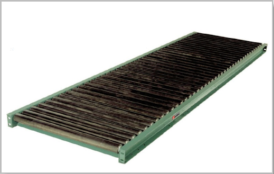 Gravity rollers are non-powered roller conveyors. They use the power of gravity to effortless transport materials down a slope. They can help manage inventory during packing and unpacking materials, pallet handling, and more.
Gravity rollers are non-powered roller conveyors. They use the power of gravity to effortless transport materials down a slope. They can help manage inventory during packing and unpacking materials, pallet handling, and more.
Chain Drag Conveyors
Chain drag conveyors transport raw materials continuously. This can include minerals, cement, and other materials. They feature two chains and a motorized system to transport these materials.
Slat Conveyors
Slat conveyors feature metal slats connected to two metal chains attached to a motor. Companies use them for moving items unsuitable for transport by metal rollers. These items tend to be oddly shaped.
Wire Mesh Belt Conveyors
These belt conveyors are made of metal links woven together to create a flexible design. Suppliers can manufacture them from galvanized steel, stainless steel, carbon, or other materials. Wire mesh belts are ideal for heating and cooling, come in a wide range of sizes, and can be customized to your specifications. Companies use them for high and low-temperature applications.
Benefits of Conveyors in an Industrial Warehouse
Conveyors can be an excellent investment in your materials handling operation. They are generally safer than forklifts and other equipment. They are also affordable and require minimal maintenance. Some more benefits include:
Are You Interested in a Conveyor System for Your Industrial Warehouse?
For over 40 years, Handling Systems Inc. has been a leading supplier of material handling solutions. Contact us today to learn more about our conveyor solutions and to find out what our talented engineers can do for you.